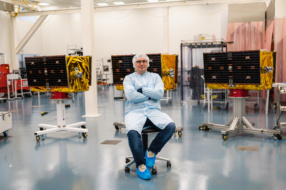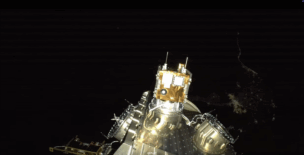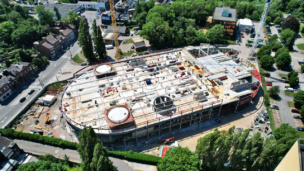London-based Seraphim, which bills itself as first and largest space-focused investment fund, has announced the ninth cohort to participate in its Space Camp program. The 11-week accelerator pushes founders to hone their investment pitch, and connect with mentors, culminating in an investor day.
The seven startups selected for Mission 9:
- Ntention, a Norwegian company building interactive extended reality and robotic systems for astronauts
- Lunasa Space, a UK-based in-orbit services startup with an orbital transfer vehicle as its first offering
- ODIN Space, or The Orbital Debris Impact Network, which is creating a space situational awareness (SSA) payload
- Smart IR, which is building graphene-based tiles for thermal management on satellites
- AIRMO, a German emissions-monitoring startup
- Cislunar Industries, an American company working on in-orbit manufacturing using materials harvested from orbital debris
- Deep Planet, which uses EO data, IoT sensors and AI to help winemakers monitor their crop health
Space Camp: Seraphim began Space Camp in 2018 as a way to get involved with early stage startups before they were ready to raise the Series A and later stage funding rounds that the investment fund is focused on.
“What it builds for us is this firehose of investments, ultimately, that can go into our fund,” Rob Desborough, a managing partner at Seraphim Space and CEO of Space Camp, told Payload. “So when we’re writing a $25 million ticket at Series B, we can do that with real conviction, because we found that company potentially pre-incorporation four or five years earlier.”
Since its inception…
…Seraphim has led eight cohorts and 55 total companies through Space Camp. All but one of those companies are still operating today. Cohort companies have collectively gone on to raise $180M from 70 different investors.
- The fund taps its network for insights into investable emerging technologies, then looks to its own pipeline for early, early-stage teams building in the space.
- Space sustainability has a huge footprint in the Mission 9 cohort. “I think that is a sign of the times, in terms of deal flow,” said Desborough.
Space Camp aims to help talented founders with great ideas avoid a great pitfall for early-stage startups: a bad pitch. Of the participants, “70 to 75% are PhD-level engineers, astrophysicists, quantum scientists,” said Desborough. “So if you give those guys five minutes to pitch, you’ll get four minutes and 58 seconds of science, two seconds about a value proposition or business. We’ve got to really invert that, turn it on its head.”
Up next: Though the UK-based Space Camp is open to startups from across the globe, Seraphim will start a San Francisco spinoff in September and an Asia-Pacific spinoff, potentially in Singapore, next year, Desborough said.



